Weather in
ZanzibarJANUARY 2026
January marks the hottest month in Zanzibar, bringing long, sun-filled days with daytime temperatures reaching 30°C and warm evenings averaging around 27°C.
As part of the short dry season, the archipelago enjoys minimal rainfall totaling 22 mm spread across four rainy days, making it perfect for those looking to soak up the sun
With daytime temperatures reaching 30°C and nighttime lows of 27°C, the weather is consistently balmy, creating an ideal setting for beach activities and outdoor adventures.
The surrounding Indian Ocean remains inviting, with crystal-clear waters perfect for swimming, snorkeling, and diving.
This month is also the start of one of Zanzibar’s peak tourist seasons, attracting visitors seeking a tropical escape after the holiday season.
With 10 hours of sunshine daily, it's a fantastic time to explore the island’s natural beauty, from its pristine beaches to lush spice plantations.
While January is a bustling period, it is not as crowded as the later months of the peak tourist seasons, offering a balance between lively atmosphere and space to unwind.
Whether you're after relaxation or adventure, January is a prime time to visit Zanzibar.
January Weather Breakdown
Temperature & Humidity
January’s weather in Zanzibar is characterized by consistently warm temperatures and moderate humidity.
The average temperature during the day reaches 32°C (90°F), while nights remain warm at around 25°C (77°F).
This period falls within the short dry season, meaning there is plenty of sunshine with little interruption from rain.
Moisture levels hover around 64%, making the heat noticeable but not overwhelming, especially with the coastal breeze offering relief.
While daytime conditions can feel hot, early mornings and late evenings provide a more comfortable climate for exploring Stone Town or enjoying beachfront dining.
Rainfall Patterns
Unlike the long dry season that stretches from June to October, January still sees occasional rain, though it is typically brief and light.
Zanzibar receives an average of 54.6mm of rain, which usually comes in short showers that clear up quickly.
Rainfall in January is sporadic, often occurring in the early morning or late at night, ensuring that most days remain sunny and bright.
These showers help maintain Zanzibar’s lush greenery without significantly impacting travel plans, making January one of the best months to visit for those looking to avoid prolonged rainy periods.
Sea Conditions for Swimming
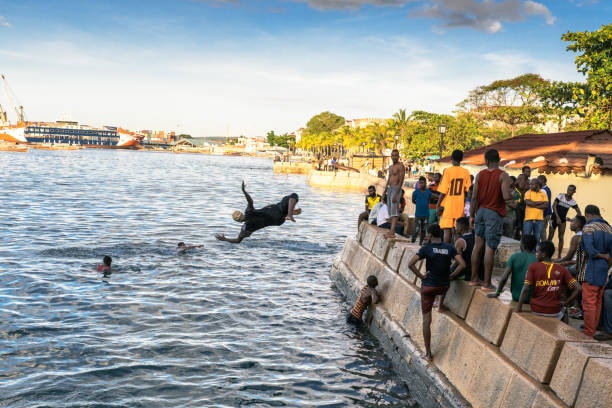
With the warm Indian Ocean surrounding Zanzibar, January offers some of the best sea conditions for swimming, snorkeling, and diving.
The sea temperature averages 29°C (84°F), providing a consistently warm and inviting experience for water activities.
The dry season ensures excellent visibility underwater, especially around famous diving sites like Mnemba Atoll and Chumbe.
Since strong winds and rough seas are rare during this period, even beginner swimmers and snorkelers can comfortably explore the island’s marine life.
Calm waters also make it a great time for boat excursions, from dhow cruises to dolphin spotting near Kizimkazi.
January’s weather patterns create an almost perfect environment for beachgoers and adventure seekers alike.
The combination of high temperatures, minimal rain, and hot waters ensures that every day offers an opportunity to enjoy the outdoors.
While the sun is intense, especially in the early afternoon, travelers can plan their activities accordingly, taking advantage of cooler mornings and sunset strolls along Zanzibar’s stunning coastline.
Despite the warmth, the island’s coastal winds and moderate humidity prevent conditions from becoming unbearable.
Visitors should stay hydrated and use sun protection, especially during midday hours.
Since January is part of Zanzibar’s peak tourist seasons, beaches and resorts are lively, but not overcrowded, providing a vibrant yet relaxed atmosphere.
Overall, January stands out as one of the most desirable months to visit Zanzibar, giving all the best aspects of the dry season without the crowds of later peak months.
Whether relaxing on the beach, exploring cultural sites, or enjoying water sports, the weather remains favorable throughout the month, ensuring a memorable island getaway.
Why Visit Zanzibar in January?
Fewer Tourists, Better Deals
January falls just after the busiest holiday rush, making it one of the best times to visit Zanzibar with less tourists on the beaches and in hotels.
While it remains part of the peak tourist seasons, crowds are noticeably smaller compared to December, allowing for a more relaxed experience.
This period also offers better deals on accommodations and flights, as many travelers have wrapped up their holiday vacations.
For those looking to explore Zanzibar’s stunning coastline, historic Stone Town, or the spice plantations without peak-season congestion, January presents an excellent opportunity.
Wildlife & Safari Combos
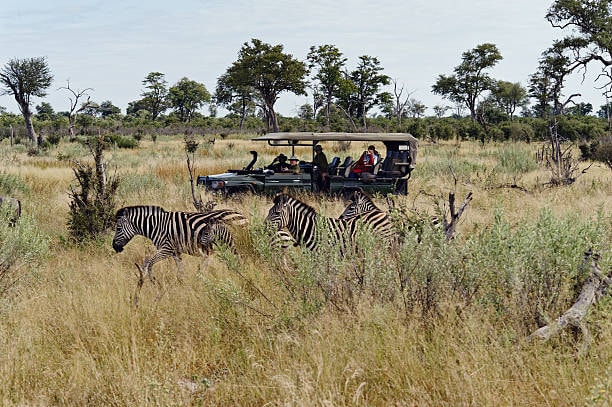
One of the best time to visit Zanzibar is when you can combine it with a Tanzanian safari, and January is ideal for that.
The short dry season provides excellent wildlife viewing conditions, particularly in Serengeti National Park, which is just a short flight from the island.
This month marks the start of the Great Migration’s calving season, with thousands of wildebeest giving birth and attracting predators like lions and cheetahs.
Pairing a beach getaway with a thrilling safari ensures a well-rounded Tanzanian adventure, blending relaxation with exhilarating wildlife encounters.
Festivals & Local Culture
January offers visitors a chance to engage with Zanzibar’s culture through events and celebrations.
While the famous Sauti za Busara Music Festival usually takes place in February, travelers in late January can still experience the island’s vibrant arts and music scene through smaller concerts and cultural gatherings.
Stone Town’s lively markets, historic sites, and Swahili traditions make every visit an enriching experience.
Engaging with locals and experiencing traditional cuisine adds depth to any trip, making January one of the best times to visit Zanzibar for cultural exploration.
Perfect Beach Weather
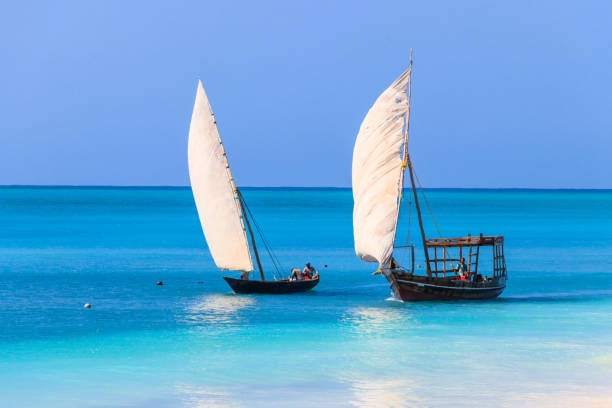
With warm temperatures, minimal rain, and crystal-clear waters, January is the best time to visit Zanzibar for beach lovers.
The soft white sands of Nungwi, Kendwa, and Paje offer idyllic settings for sunbathing and relaxation.
Whether you're into kitesurfing, snorkeling, or just unwinding by the shore, the pleasant weather ensures that every beach day is perfect.
The gentle ocean breeze and warm sea temperatures make water activities enjoyable, from diving at Mnemba Atoll to sunset dhow cruises along the coast.
Balanced Atmosphere of the Shoulder Season
Although January is part of the peak travel period, it also carries elements of a shoulder season, striking a balance between vibrant energy and peaceful retreats.
Unlike the overwhelming crowds of December and late summer, January allows travelers to enjoy the best time to visit Zanzibar without the full intensity of the high season.
Whether you prefer lively beachfront bars or quiet hideaways, Zanzibar offers a variety of experiences suited to different travel styles.
With stunning weather, cultural experiences, and exciting safari extensions, January remains one of the most rewarding months to explore Zanzibar.
Top Activities for January Visitors
Exploring Stone Town’s History
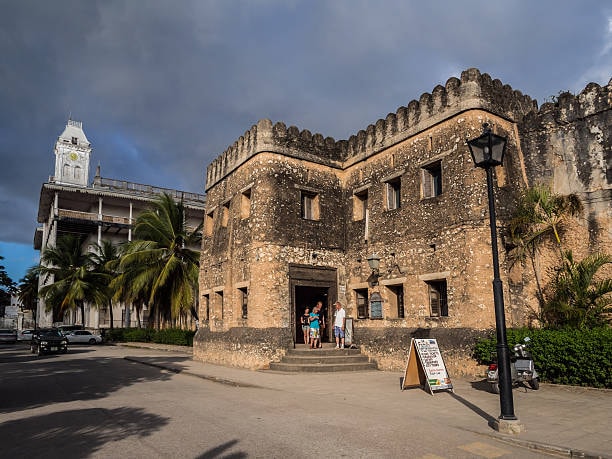
Stone Town, the cultural heart of Zanzibar Island, is a must-visit in January when the dry weather makes exploring its historic streets enjoyable.
As a UNESCO World Heritage Site, it offers a fascinating mix of Swahili, Arab, and European influences.
Wander through the narrow alleys, admire the intricately carved doors, and visit landmarks like the House of Wonders and the Old Fort.
The bustling Darajani Market provides a glimpse into daily life, where vendors sell everything from fresh spices to colorful fabrics.
As the sun sets, head to Forodhani Gardens, where the night market comes alive with sizzling seafood and local delicacies.
Beach Escapes & Water Sports
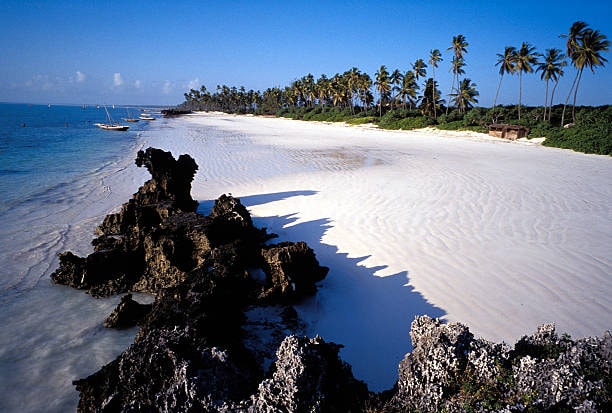
Matemwe Beach Zanzibar
January is one of the best times to enjoy Zanzibar Island’s stunning beaches, thanks to warm temperatures and minimal rainfall.
The powdery white sands of Nungwi and Kendwa provide a perfect setting for relaxation, while Paje and Jambiani offer excellent conditions for kitesurfing.
Those looking for a thrilling experience can try deep-sea fishing, jet skiing, or stand-up paddleboarding.
For diving enthusiasts, Matemwe and Mnemba Atoll boast crystal-clear waters, vibrant coral reefs, and diverse marine life, making them prime spots for underwater exploration.
Jozani Forest’s Red Colobus Monkeys
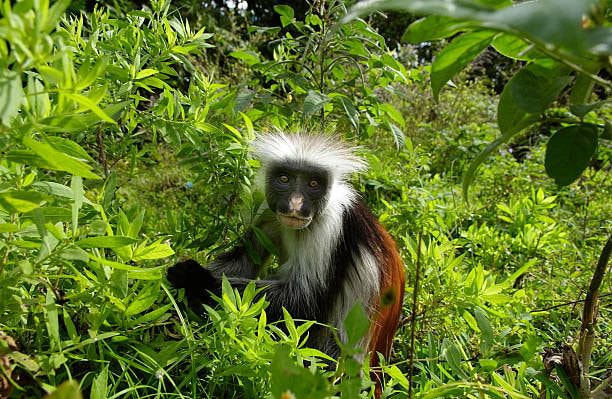
Zanzibar Red Colobus Monkey
For nature lovers, a visit to Jozani Chwaka Bay National Park is a highlight of any trip to Zanzibar.
This lush forest is home to the rare Red Colobus monkeys, which are endemic to Zanzibar.
These playful primates can often be seen swinging through the treetops, offering unforgettable wildlife encounters.
The park also features a network of walking trails that lead through mangroves and rich tropical vegetation, providing opportunities to spot other wildlife, such as bush babies and colorful bird species.
Dhow Cruises & Sunset Sailing
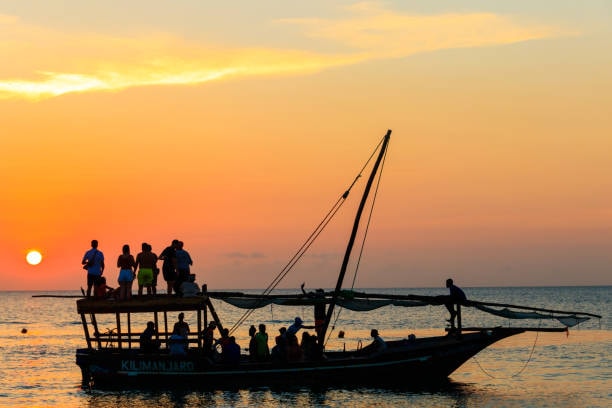
One of the most magical ways to experience Zanzibar is by taking a traditional dhow cruise at sunset.
These wooden sailing boats glide across the calm waters, offering breathtaking views of the sun dipping below the horizon.
Nungwi and Kendwa are popular departure points for these cruises, often accompanied by snacks, drinks, and even live music.
For a more adventurous option, some dhow trips include snorkeling stops at secluded sandbanks or nearby coral reefs.
Snorkeling & Diving at Mnemba Atoll
The clear waters of Zanzibar Island make January an ideal time for snorkeling and diving, with Mnemba Atoll being one of the top spots.
This marine conservation area is teeming with colorful coral gardens, tropical fish, sea turtles, and even dolphins.
Whether you’re an experienced diver or a beginner, the calm conditions ensure excellent visibility and a memorable underwater experience.
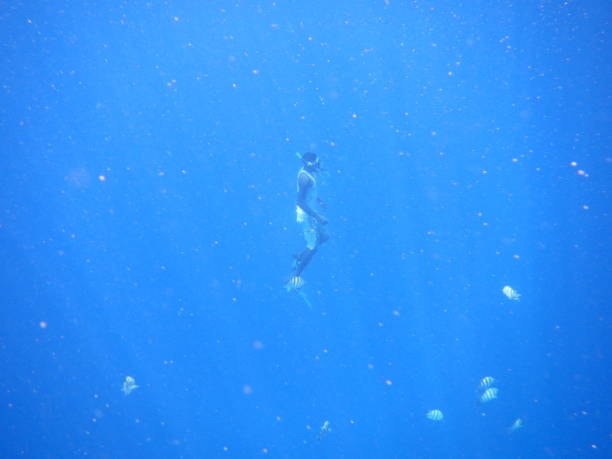
Spice Farm Tours & Local Flavors
A visit to one of Zanzibar’s spice farms offers a sensory journey through the island’s rich agricultural heritage.
Guides lead visitors through lush plantations, explaining the origins of spices like cloves, vanilla, cinnamon, and nutmeg.
Travelers can also sample fresh tropical fruits and experience traditional Swahili cooking demonstrations.
Visiting Prison Island & Its Giant Tortoises
A short boat ride from Stone Town, Prison Island (Changuu) is a fascinating excursion.
Originally built as a prison, it is now home to a sanctuary for giant Aldabra tortoises, some of which are over 100 years old.
Visitors can interact with these gentle creatures and enjoy the island’s pristine beaches and snorkeling spots.
Wildlife Encounters on Safari Blue
Safari Blue is one of Zanzibar’s most popular full-day excursions, combining multiple activities into one adventure.
Departing from Fumba, this boat tour takes visitors through the Menai Bay Conservation Area, where they can snorkel in coral reefs, swim in hidden lagoons, and feast on fresh seafood.
Dolphins are often spotted along the way, making it a fantastic wildlife encounter.
Kizimkazi Dolphin Watching
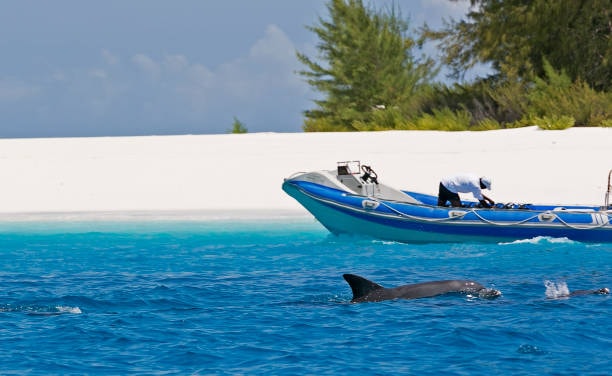
Kizimkazi, located on Zanzibar Island’s southern coast, is a well-known spot for dolphin encounters.
Early morning boat trips offer a chance to see pods of bottlenose and humpback dolphins in their natural habitat.
While ethical guidelines encourage responsible viewing, the experience of seeing these majestic creatures up close is unforgettable.
Cultural Experiences in Local Villages
For travelers seeking a deeper connection with Zanzibar’s culture, visiting villages like Jambiani or Matemwe provides insight into traditional island life.
Engage with local artisans, learn about seaweed farming, and witness the daily routines of fishermen and craft makers.
These experiences offer a more authentic side of Zanzibar beyond its beaches and resorts.
Travel Tips for January

Packing for Heat & Humidity
January falls in Zanzibar’s short dry season, bringing intense sunshine and warm temperatures.
Travelers should pack lightweight, breathable clothing made from cotton or linen to stay comfortable in the heat. A wide-brimmed hat, sunglasses, and reef-safe sunscreen are essential to protect against strong UV rays.
Given the island’s humidity, moisture-wicking attire helps keep cool, while a light rain jacket may come in handy for occasional brief showers.
For those planning water activities, quick-dry swimsuits and water shoes are highly recommended.
Avoiding Crowds
Although January is part of the short dry season, it sees fewer visitors than the peak months of December and July.
Early January is the best time to visit, as the holiday rush begins to fade, making it easier to explore attractions like Stone Town and the island’s beaches without large crowds.
Travelers looking for a more secluded experience should consider staying in quieter areas like Matemwe or Michamvi instead of busier spots like Nungwi and Kendwa.
Health Precautions
Staying hydrated is crucial during Zanzibar’s balmy January weather, as sunshine dominates the isle.
Travelers should drink plenty of bottled or filtered water to prevent dehydration.
It’s also wise to pack mosquito repellent, especially for evening outings, as some areas may have insects despite the dry season.
Those planning a safari extension to mainland Tanzania should check if malaria precautions or additional vaccinations are needed.
Currency & Payments
While Zanzibar is a tourist-friendly destination, travelers should carry some cash in Tanzanian shillings for small purchases, as not all places accept credit cards.
ATMs are available in Stone Town and larger towns, but rural areas may have limited banking facilities.
Local Transportation

For getting around, travelers can use taxis, dala-dalas (local minibuses), or rental scooters.
However, taxis do not have meters, so negotiating fares in advance is recommended.
Hiring a local guide can enhance the experience, especially when exploring historical and cultural sites.
Island Etiquette & Respecting Culture
As Zanzibar is a predominantly Muslim island, travelers should dress modestly when visiting towns or villages.
Bikinis and shorts are acceptable on beaches, but covering shoulders and knees in public areas shows respect for local customs.
During interactions with locals, learning a few Swahili phrases, such as "Jambo" (hello) or "Asante" (thank you), is always appreciated.
Seasonal Comparisons & FAQs
January vs. February: Weather Shifts
Both January and February fall within Zanzibar’s short dry season, offering warm temperatures and clear skies.
However, January is slightly hotter, with an average temperature of 32°C (90°F) during the day, while February sees marginally cooler evenings.
Rainfall is minimal in both months, but occasional brief showers can occur. February, being the tail end of this dry spell, may feel drier than January.
For travelers who enjoy year round tropical warmth, both months offer excellent conditions for beach activities and exploration.
When to Avoid Zanzibar
Zanzibar is a year round destination, but the rainy season from mid-March to May can be less ideal for visitors.
This period sees heavy rainfall, high humidity, and choppy seas, making some activities less enjoyable. The short rains occur in November, but they are typically brief and do not disrupt travel plans.
If avoiding rainy season weather is a priority, January remains one of the best months to visit.
Top Visitor Questions Answered
Is January a good time to visit Zanzibar?
Yes! January is part of the dry season, offering warm temperatures, little rainfall, and perfect beach weather.
Does it rain in Zanzibar in January?
Rainfall is minimal in January, with occasional short showers that clear up quickly.
Are the beaches crowded in January?
January is a popular time to visit, but Zanzibar’s vast coastline ensures you can still find peaceful spots
What is the water temperature like?
The Indian Ocean stays warm year-round, usually around 27-29°C (80-84°F) in January, making it perfect for swimming and snorkeling.
Plan Your Perfect Zanzibar Escape
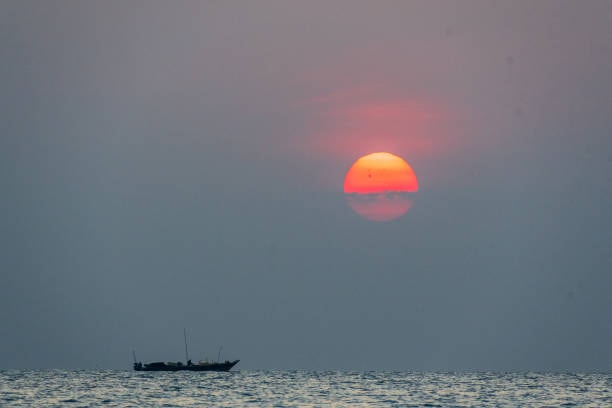
Zanzibar in January is the ideal time to visit, offering warm temperatures, clear skies, and minimal rain.
As the month progresses, expect sun-drenched days with an average high of 32°C (90°F) and perfect sea conditions for swimming and diving.
Compared to peak seasons like July and October, tourist numbers are lower, creating a more relaxed atmosphere while still being in full swing with cultural events and wildlife encounters.
With short-lived showers and weather patterns favoring dry, sunny days, January is one of the best times to explore Zanzibar’s beaches, history, and nature.
Unlike November’s short rains or March’s wetter season, this period provides ideal conditions for travelers seeking an unforgettable holiday in East Africa.
Whether you're visiting Stone Town, snorkeling in crystal-clear waters, or pairing your trip with a safari in Tanzania, expect a trip filled with adventure and relaxation.
Start planning now and make the most of Zanzibar in January!






